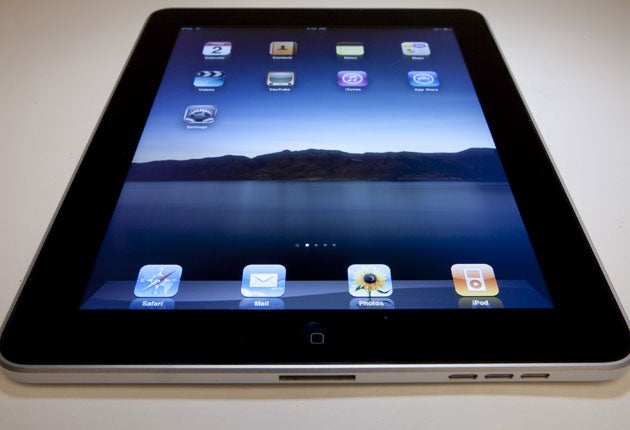Rhodri Marsden: You can't stir your tea with an iPad
Cyberclinic

Your support helps us to tell the story
From reproductive rights to climate change to Big Tech, The Independent is on the ground when the story is developing. Whether it's investigating the financials of Elon Musk's pro-Trump PAC or producing our latest documentary, 'The A Word', which shines a light on the American women fighting for reproductive rights, we know how important it is to parse out the facts from the messaging.
At such a critical moment in US history, we need reporters on the ground. Your donation allows us to keep sending journalists to speak to both sides of the story.
The Independent is trusted by Americans across the entire political spectrum. And unlike many other quality news outlets, we choose not to lock Americans out of our reporting and analysis with paywalls. We believe quality journalism should be available to everyone, paid for by those who can afford it.
Your support makes all the difference.The futuristic space-lozenge isn't officially unleashed in the UK until Friday, but iPads have already been stealthily invading our towns and cities, wedged under the arms of early adopters with a relaxed attitude towards transatlantic shipping charges. A few days ago, a designer for a London book publisher tweeted her astonishment at being present at a meeting where she was the only person in attendance who wasn't carrying one. Her pen and paper were considered passé; after all, you can't play Command & Conquer: Red Alert on a biro. But many would suggest that she was some £600 better off. After all, you can't stir your tea with an iPad.
Doubts about the iPad's form and function are loudly voiced online. Anyone doing extensive research about their prospective purchase, rather than following their gut instinct, would end up having internal dialogue along the lines of: "Is this a stupidly large phone that I can't make calls on, or a laptop without a lid that I can't type properly on?" But the figures themselves are unavoidable: an estimated 200,000 people a week in the USA are smitten enough by the thing to want to buy one, and all the signs are that the iPad is way more than a chic executive toy, with greater longevity than a Newton's Cradle, a Japanese zen rock garden or pin art.
Customer satisfaction has been shown to be hovering around 90 per cent, and of those voicing discontent, the most frequent objection isn't even a fault, it's a feature: lack of support for Adobe Flash. Steve Jobs has been vocal about his unwillingness to allow Flash to operate on the iPhone or the iPad, thus causing a number of websites – especially video-based ones – to be unviewable. But Adobe has now hit back with a very public campaign (under the curious banner of "We Love Apple") to try and get Jobs to change his mind, or at least persuade the public that Adobe are the good guys in all this.
In reality, they're probably as bad as each other. Jobs's reasoning: Why encourage developers to write software for the iPad and iPhone that uses Flash, a proprietory piece of software, when it's perfectly possible to bypass Flash using "open" alternatives such as HTML5? Adobe counter this by asking why Apple doesn't have an "open" policy that allows its customers to use devices exactly as they wish (despite the fact that few people get cross with games console manufacturers for having a similar stance).
That word – "open" – gets used by company spokesmen as much as "change" is by politicians, but the argument ultimately boils down to two companies trying to shore up their profits. Google have now cosied up to Adobe, positioning its Android operating system as the mobile solution that's Flash-friendly, but how many people actually care? There's a YouTube app for the iPhone, so an unviewable YouTube website is irrelevant. The web is moving in Apple's direction, too; 26 per cent of online video is now viewable on Apple's portable devices, up from 10 per cent in January. And Friday's queues of iPad customers will be fairly unconcerned about the prospect of not being able to watch catch-up TV such as BBC iPlayer on their new gadget. After all, they can always play Command & Conquer: Red Alert on it instead.
***
While the iPad is destined to become this summer's accessory of choice, it'll be a while until it overtakes the mobile phone as a handy emotional crutch. The mobile's role in making up for deficiencies in our personalities is revealed in one of those surveys masquerading as news from Orange this week: more than 80 per cent of us apparently admit to making or receiving fake phone calls either to appear busy, to look popular, or to get out of an unpleasant situation. As someone who broke his personal record for shortest date ever back in November when a girl made her excuses after 20 minutes, claiming that her flatmate had called saying she'd broken her leg, I can certainly vouch for the effectiveness of apps such as Orange's "Fake A Call" for removing yourself from the company of a grumpy, balding writer such as myself. What more recommendation do you need?
Join our commenting forum
Join thought-provoking conversations, follow other Independent readers and see their replies
0Comments